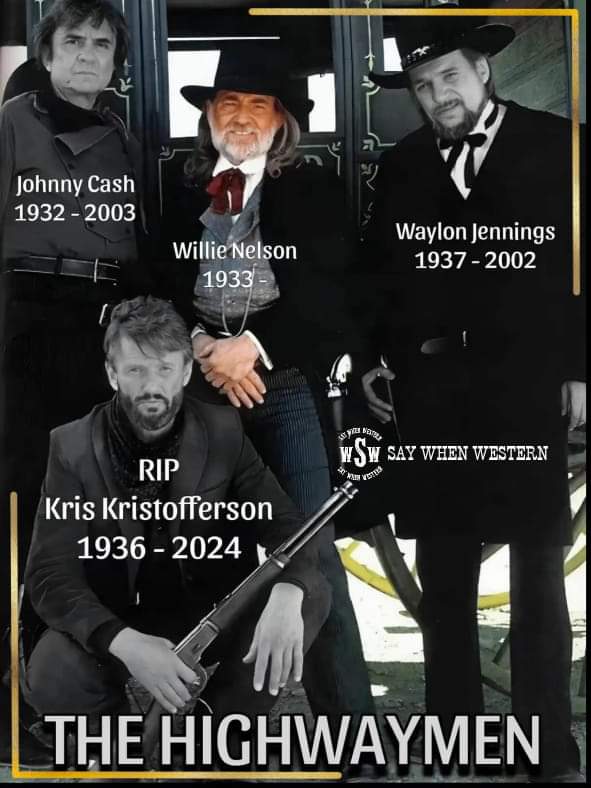In the pantheon of country music, few groups have ever commanded the respect and reverence of The Highwaymen, a supergroup formed in the mid-1980s that brought together four of the most iconic and beloved names in the genre: Johnny Cash, Waylon Jennings, Willie Nelson, and Kris Kristofferson. Individually, these men were already legends—known for their rebellious spirit, outlaw personas, and unmatched contributions to country and folk music. But together, they became something even greater: a symbol of brotherhood, artistry, and resilience. Today, as the years have passed, only one member remains alive—Willie Nelson, the enduring outlaw, whose legacy continues to thrive.

The Birth of The Highwaymen
The story of The Highwaymen began almost accidentally. In 1984, Cash, Jennings, Nelson, and Kristofferson found themselves in the same recording studio in Nashville, laying down tracks for what was initially meant to be a collaborative project between the four old friends. Producer Chips Moman guided them as they recorded Jimmy Webb’s song “Highwayman,” a haunting ballad that tells the story of four different souls across time—a highwayman, a sailor, a dam builder, and a starship pilot—each facing death and reincarnation.
The song struck a chord with all four men, not just for its tale of lives lived on the edge, but for how it paralleled their own. Each had lived through their own highs and lows—addiction, personal loss, the battles with Nashville’s establishment—and had come out stronger on the other side. In a way, they were singing about themselves, a group of country renegades whose paths crossed time and again, bonded by their shared love of music and life on the road.
The single, “Highwayman,” was a hit, reaching No. 1 on the Billboard country charts. The success of the song solidified the idea that this wasn’t just a one-time collaboration, but the birth of a new group. Thus, The Highwaymen was officially born, releasing their first album Highwayman in 1985.

A Brotherhood Like No Other
What made The Highwaymen so special wasn’t just their individual talents, but the genuine friendship and camaraderie between them. Despite their larger-than-life personas—Johnny Cash as the “Man in Black,” Waylon Jennings as the hard-edged outlaw, Willie Nelson as the laid-back stoner poet, and Kris Kristofferson as the soulful songwriter—their dynamic was one of mutual respect and admiration. Each member brought something unique to the group.
Johnny Cash’s deep, resonant voice and his connection to the downtrodden brought a gravitas to the group’s sound. Waylon Jennings’ signature baritone, steeped in outlaw country roots, added grit and edge. Willie Nelson’s nasal drawl, steeped in tradition yet wholly original, served as the glue that held the group together. And Kristofferson’s poetic songwriting and reflective demeanor added a layer of introspection.
Over the years, they recorded three more albums together: Highwayman 2 (1990), The Road Goes On Forever (1995), and Live: American Outlaws (2016, posthumously released). Their live performances were legendary, with the four men sharing the stage like old friends swapping stories around a campfire. There was no competition—just a deep, unspoken understanding that they were stronger together.

Loss and Legacy
Time, however, is relentless. In 2002, the group suffered its first loss when Waylon Jennings passed away at the age of 64, after years of battling health problems. His death marked the end of an era for outlaw country, as Jennings had been a driving force behind the movement. His rebellious spirit, which had helped shape the sound and ethos of country music in the 1970s, was now gone.
In 2003, just one year after Jennings’ death, the world lost Johnny Cash. The “Man in Black” had been battling illness for years but continued to record music until the very end. His death left a void in the world of music, not just for his powerful voice and storytelling, but for his role as a voice for the voiceless. Cash’s ability to empathize with the marginalized, the forgotten, and the broken made him more than just a country star—he was a cultural icon.
Then in 2020, Kris Kristofferson announced his retirement from music, signaling the quiet end of another chapter. While he is still alive today, his presence in the music world has faded, as he has chosen to live out his later years in peace.
Willie Nelson now stands as the last surviving member of The Highwaymen. At 91 years old, Nelson has become an enduring symbol of resilience, freedom, and artistic integrity. Despite the passage of time and the loss of his brothers-in-arms, Nelson continues to tour, record, and advocate for causes close to his heart, from environmental sustainability to cannabis legalization. His distinctive voice and iconic guitar, Trigger, remain as vibrant as ever, as does his love for the music that has defined his life.

A Legacy That Lives On
The Highwaymen may no longer be able to take the stage together, but their music endures. Their songs continue to resonate with fans young and old, a testament to the timelessness of their sound and the authenticity of their message. They sang about life, death, love, and loss, often with a rawness that made their music feel like an intimate conversation between old friends.
Willie Nelson, the last Highwayman, carries the torch for his fallen comrades. As long as he is around, the spirit of The Highwaymen will continue to live on. And even when he’s gone, their legacy will remain etched into the very fabric of American music, a reminder of the power of friendship, resilience, and staying true to oneself in the face of adversity.
The road may go on forever, but for The Highwaymen, the journey has already secured them a place in history as one of country music’s most legendary acts.

